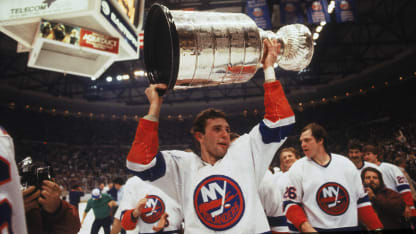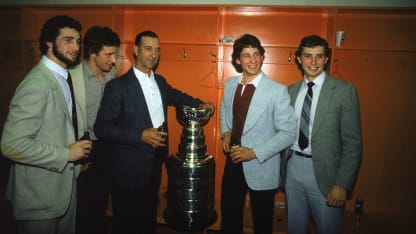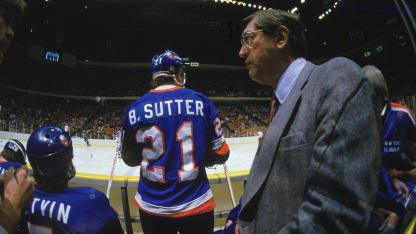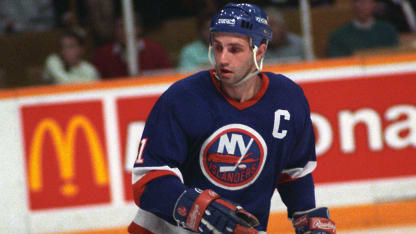"I take pride in being a two-way player" -- Brent Sutter, The Quiet One
Among heroes of the Islanders Dynasty Years, one of the least publicized -- despite being especially effective -- was late-comer Brent Sutter.
There are solid reasons why this was the case even though -- as a first-rate center -- he helped steer Al Arbour's teams to a pair of Stanley Cups in 1982 and 1983.
Maven's Memories: Brent Sutter, The Anonymous Star
Stan Fischler takes a look at one of the Islanders' former captains

© B Bennett/Getty Images
By
Stan Fischler
Special to NHL.com
One reason for the non-attention was because his older brother, Duane (Dog) Sutter, preceded Brent to Nassau. Duane was a gregarious, hell-for-leather player who was a journalist's joy to interview.
Another reason why Brent never got the coverage he deserved was because he was generally behind Pat LaFontaine, one of the best centers in team annals. Pat was outgoing like Dog; Brent, alias Pup, was not.
Or, perhaps Brent just wanted it that way. He was, in fact, the Islanders Quiet Man; as taciturn in person as he was superior on the ice.
Brent shunned publicity. Sure, he would answer questions and when he succeeded voluble Denis Potvin as Islanders captain, he never hesitated meeting the media. But the limelight, he could do without.
A naturally quiet Western Canadian, Brent was an 18-year-old stripling when he arrived at his first Islanders training camp in September 1980. The club already had won a Stanley Cup and he was dazzled by his surroundings.
"I was so nervous being around the champions that when I got on the training table to be examined, I threw up all over the floor," he remembered with a wince.
General Manager Bill Torrey knew that the kid from Viking, Saskatchewan needed time to mature. Bow Tie Bill also knew all about The Sutter Effect. By the 1980s it was the talk of the league.
Not only was older brother, Duane making a name for himself as a quintessential, hard-working Islander but there were other Sutters gaining NHL headlines elsewhere.
Older brother Brian Sutter had emerged as captain as well as the face of the St.Louis Blues, playing a dozen seasons at left wing. He set the template for the other brothers, armed with perseverance and grit.
Another Sutter, the cosmopolitan Darryl, already had gone to Japan to play and study hockey before spending seven solid years with the Chicago Blackhawks.
Duane's eight years in Uniondale included four Stanley Cups and his involvement in a never-to-be-broken streak of 19 consecutive playoff series wins from 1980 through 1984.
The Sutter Twins, Rich and Ron, would follow Brent and carry the never-say-die spirit wherever they skated. Veteran hockey men such as former NHL manager and coach Harry Neale always wanted a Sutter on his team.
Neale: "There aren't many players you wish you had on your team for reasons other than their natural ability. After watching a Sutter run his head into the glass or poke somebody or fight off five players, I wished I had a couple of those guys on my team."

© B Bennett/Getty Images
Torrey ensured that the Nassaumen would be well-Sutter-ed. Just weeks after the Islanders first Cup win, Bow Tie Bill picked Brent in the 1980 Entry Draft's first round, 17th overall.
Having earned his Junior hockey epaulets in Red Deer and Lethbridge, Brent, 18, showed up at the Isles training camp with stars in his eyes and butterflies in his stomach. He was awed by the Champs around him.
In the definitive book on the Sutter Family -- "Six Shooters" -- author Dean Spiros pointed out that Brent knew he was not ready for the NHL after attending his first camp.
"Maybe I had the talent," Brent told Spiros, "but not the knowledge or mental toughness to make the most of it."
He returned to Junior hockey and so impressed chief scout Jim Devellano that Torrey finally elevated Brent in the middle of the 1981-82 season. Coach Al Arbour placed him on a line with brother Duane and Clark Gillies.
"We saw all the ice time we could ask for," Brent recalled. "I was on a real high when we entered the (1982) playoffs. But it all came to a screeching halt for me."
In the second game of the first playoff round -- against the hated Rangers -- Brent lost the puck on a key play and Rob McClanahan scored for the Blueshirts. Brent allowed that youthful "cockiness" resulted in his mistake.
Coach Al Arbour's reaction was unequivocal. The rookie did not enjoy another regular shift for two more series; not until the Final round against Vancouver; a four-win sweep for the club's third straight Cup.
Fortunately, Sutter took his lengthy benching like a trouper. He claimed that it made him "mentally tough" and credited Skipper Arbour for doing the right thing.
What he got to appreciate -- and understand about the Isles Family -- was that Arbour and Torrey were like a pair of caring uncles. They practiced tough love but also rewarded competence.
And once Brent was placed on a line with Brother Duane and fleet Bobby Bourne, Brent began gaining confidence while simultaneously surviving the potholes inevitably detouring a young NHLers career.
Not known for his guffaws, Brent also got his laughs from team humorist Clark Gillies who, for a time, skated on a line with Duane and Brent. When Arbour told Gillies he'd be with the brothers, Clark had the perfect squelch:
"You mean I have to change my name to C, Sutter. No thanks!"
Brent was, however, thankful that he was able to skate alongside a future Hall of Famer such as Gillies and behind top center Bryan Trottier. ("Early in my career, I accepted the fact that I had to play behind Trots.")
Brent: "I never lost faith in myself while Al and Bill never lost faith in me. Once I got a good feel for the league, Al had me out to take key face-offs and I also worked the power play. I now was a regular with the big team. I was wanted."

© B Bennett/Getty Images
In other words, Brent was viewed as a young Bryan Trottier, featuring the Trots kind of persistence, savvy and skills.
Brent: "I learned a lot just by watching Bryan. On top of that he was a good teacher for me; a great guy. Same with Butch Goring. I watched and got better in the process of doing what a good center is supposed to do."
Yet, as good as Brent was, the press usually deferred to leaders such as Denis Potvin, Mike Bossy, Bryan Trottier and Bill Smith for stories. Even Dog Sutter.
Bill Torrey's son, Rich, who worked with the Islanders in those halcyon Cup years, remembered being fascinated by the Sutter Brothers' contrasting personalities.
"Dog was so outgoing," said Rich Torrey, "a real, live one. On the other hand, Brent was the quiet one; but always there to do the job the right way."
By the 1982-83 season, Brent had reached a new level of competency. This was evident during The Drive For Four, culminating in the four-game sweep of Edmonton in the Final round. Championship Number Four for the Isles.
"That gave me a tremendous boost of confidence," he allowed. "Over those four series, I averaged more than a point a game."
Yet another feather in Sutter's cap was an invitation to play for Team Canada during the 1984 Canada Cup. Brent would be skating alongside such legendary heroes as Wayne Gretzky, Mark Messier and Paul Coffey.
Helping to win the trophy merely added more to Brent's confidence. As veterans such as Bossy, Gillies, Bourne and Trottier approached the twilight of their Islanders careers, Brent's graph kept climbing as did his leadership ability.
"I began to realize that I meant as much to the Islanders as any player," Brent told Spiros.
He proved his point by scoring a career high 42 goals and 60 assists for 102 points in 1984-85. And while there was gratification in such arresting arithmetic, Brent was even more pleasingly involved with two turning-point club decisions.
The first took place at training camp in September 1987 when Denis Potvin announced that -- no matter what happened -- he would retire the following spring.
The second came a few weeks later. Denis' departure meant that the Islanders would need a new captain. Management had to decide whether the high command would make the pick or the players, themselves.
Bow Tie Bill decided that the next man to proudly wear the "C" would be chosen by the stickhandlers. It would be a secret vote and two players were the finalists, Bryan Trottier and Brent Sutter.
Each player in the clubhouse was handed a piece of paper and told to write the name of his choice on the parchment. For obvious reasons -- future Hall of Famer, team leader -- Trots was the favorite.
But when the papers were returned and a count made, Sutter got the nod in a very close vote. Bryan and Steve Konroyd were named alternate captains.
"Once I was named captain," Brent recalled, "Trots and I talked about the way things worked out. I'm sure it hurt him a little bit; he'd been there for so many years. But there were no hard feelings. Trots meant a lot to me."

© Graig Abel/Getty Images
So, did Pat LaFontaine, a gifted, glitter guy who inevitably reached center stage while Sutter played second fiddle. In an interview with Spiros, Brent acknowledged the difference:
"I accepted the fact that I was not going to do the things Patty did. But I also believe that my role was just as important to the team as his."
"We always had a quiet competitiveness between us," Sutter continued. "It wasn't a jealous rivalry , but one where we pushed each other. I never felt slighted by the lack of attention. In fact, any lack of attention helped me; gave me time to develop."
Sutter meant a lot to his teammates and fans throughout Islanders Country. He remained captain until 1991 when he was traded to the Chicago Blackhawks.
The following verbal snapshot, which appeared in the Islanders 25th anniversary book, Pride and Passion, capsulizes Brent's impact on the team as The Man With the C:
"Sutter's influence in the dressing room was far-reaching. For his relentless drive and stoic professionalism -- Brent did not smile much but was always willing to do anything.
"Sutter was one of the most respected players in the entire league.He was able to juggle the chores of being the players' player and go-to guy for management."
While Brent was not renowned for his eloquence, when he did speak, his words were meaningful. Try these on for size -- and meaningfulness -- as a closer:
"There's a fine line between winning and losing," Brent Sutter concluded. "You stay above that line by working hard and taking nothing for granted!"


















